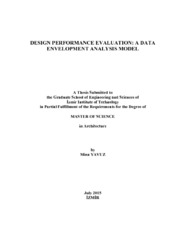Please use this identifier to cite or link to this item:
https://hdl.handle.net/11147/4446Full metadata record
| DC Field | Value | Language |
|---|---|---|
| dc.contributor.advisor | Doğan, Sevgi Zeynep | en_US |
| dc.contributor.author | Yavuz, Mina | - |
| dc.date.accessioned | 2015-12-29T08:52:32Z | - |
| dc.date.available | 2015-12-29T08:52:32Z | - |
| dc.date.issued | 2015-07 | - |
| dc.identifier.citation | Yavuz, M. (2015). Design performance evaluation: A data envelopment analysis model. Unpublished master's thesis, İzmir Institute of Technology, İzmir, Turkey | en_US |
| dc.identifier.uri | http://hdl.handle.net/11147/4446 | - |
| dc.description | Thesis (Master)--İzmir Institute of Technology, Architecture, 2015 | en_US |
| dc.description | Full text release delayed at author's request until 2018.07.23 | en_US |
| dc.description | Includes bibliographical references (leaves: 95-104) | en_US |
| dc.description | Text in English; Abstract: Turkish and English | en_US |
| dc.description | xi, 120 leaves | en_US |
| dc.description.abstract | Design performance evaluation has been the center of interest for many social actors since the antique period dating back to Aristoteles and Vitruvius. Numerous performance evaluation models have been developed for assessing design value since then. In this thesis, a Data Envelopment Analysis model is proposed for design performance evaluation in order to support the decision making process of the stakeholders in the built environment. The proposed model is based on the Design Quality Indicator (DQI), Life Cycle Cost Analysis (LCCA) and Data Envelopment Analysis (DEA) methods. DQI is a measure of design quality that measures functionality, build quality and impact assessment of the projects. LCCA is a measure for calculating the life cycle cost (LCC) of the projects. DEA is an efficiency measurement system that depends on the relative performance of the assessed units. In this thesis, a DEA model based on LCCA and DQI is developed for design performance evaluation. LCC values are used as the inputs and DQI values are used as the outputs. Accordingly, the design performance efficiency is conceptualized as the value of design calculated by the ratio of the DQI to the LCC. The developed model is applied to a sample of housing projects in İzmir. Efficient coded design values and relatively inefficient coded design values are determined. Input and output oriented strategies are then developed and discussed for improvement purposes. The proposed model constitutes an effective decision support tool for a thorough evaluation of the design performance of the given projects. | en_US |
| dc.description.abstract | Tasarım başarım değerlendirmesi, Aristoteles ve Vitruvius’a kadar antik çağlardan beri birçok sosyal aktörün ilgi merkezinde olmuştur. Tasarım değerini belirlemek üzere birçok başarım değerlendirme modeli geliştirilmiştir. Bu tezde yapılı çevre paydaşlarının karar verme sürecini desteklemek üzere, tasarım başarım değerlendirilmesi amacıyla bir Veri Zarflama Analizi (VZA) modeli önerilmektedir. Önerilen model tasarım kalite göstergesi (TKG), yaşam döngüsü maliyeti analizi (YDMA) ve veri zarflama analizi (VZA) yöntemlerine dayanmaktadır. TKG, projelerin işlevselliğini, yapım kalitesini ve etki değerini araştıran bir tasarım kalite ölçüsüdür. YDMA, projelerin yaşam döngüsü maliyetini hesaplamak için bir ölçüdür. VZA ise değerlendirilen birimlerin göreceli başarımlarına dayanan bir verimlilik ölçüm sistemidir. Bu tezde, tasarım başarım değerlendirilmesi amacıyla TKG ve YDMA tabanlı VZA modeli geliştirilmiştir. YDM değerleri girdi ve TKG değerleri de çıktı değerleri olarak kullanılmıştır. Buna uygun olarak, tasarım başarım verimliliği de tasarım değeri şeklinde kavramsallaştırılmış ve TKG’nin ve YDM’ye oranı olarak hesaplanmıştır. Geliştirilen model İzmir’deki bir grup konut projesine uygulanmıştır. Verimli kodlanan tasarım başarım değerleri ve göreceli olarak verimsiz kodlanan tasarım başarım değerleri belirlenmiştir. Daha sonra, iyileştirme amaçlı girdi ve çıktı yönelimli stratejiler geliştirilmiş ve tartışılmıştır. Önerilen model, verilen projelerin tasarım başarımının kapsamlı bir şekilde değerlendirilmesi için etkili bir karar destek aracı oluşturmaktadır. | en_US |
| dc.language.iso | en | en_US |
| dc.publisher | Izmir Institute of Technology | en_US |
| dc.rights | info:eu-repo/semantics/openAccess | en_US |
| dc.subject | Data Envelopment Analysis | en_US |
| dc.subject.lcsh | Architectural design--Evaluation | en_US |
| dc.title | Design performance evaluation: A data envelopment analysis model | en_US |
| dc.title.alternative | Tasarım başarım değerlendirmesi: Bir veri zarflama analiz modeli | en_US |
| dc.type | Master Thesis | en_US |
| dc.institutionauthor | Yavuz, Mina | - |
| dc.department | Thesis (Master)--İzmir Institute of Technology, Architecture | en_US |
| dc.relation.publicationcategory | Tez | en_US |
| item.languageiso639-1 | en | - |
| item.fulltext | With Fulltext | - |
| item.openairecristype | http://purl.org/coar/resource_type/c_18cf | - |
| item.openairetype | Master Thesis | - |
| item.grantfulltext | open | - |
| item.cerifentitytype | Publications | - |
| Appears in Collections: | Master Degree / Yüksek Lisans Tezleri Sürdürülebilir Yeşil Kampüs Koleksiyonu / Sustainable Green Campus Collection | |
Files in This Item:
| File | Description | Size | Format | |
|---|---|---|---|---|
| T001377.pdf | MasterThesis | 2.99 MB | Adobe PDF |  View/Open |
CORE Recommender
Page view(s)
160
checked on Jul 22, 2024
Download(s)
128
checked on Jul 22, 2024
Google ScholarTM
Check
Items in GCRIS Repository are protected by copyright, with all rights reserved, unless otherwise indicated.